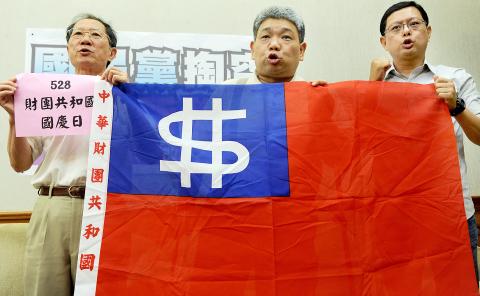The Alliance for Fair Tax Reform yesterday criticized the Chinese Nationalist Party (KMT) caucus’ draft bill for a capital gains tax on securities transactions, saying it completely lacked the “ability-to-pay” principle.
The KMT version provided more evidence that President Ma Ying-jeou (馬英九) may fail to keep his campaign promise to pursue a fairer tax system and social justice, the alliance said.
“The proposal by the KMT caucus has been the ‘worst version’ among all current drafts,” alliance convener Wang Jung-chang (王榮璋) told a press conference.

Photo: Chu Pei-hsiung, Taipei Times
His comments came a day after Minister of Finance Christina Liu (劉憶如) tendered her resignation to show her unhappiness with the KMT lawmakers’ tax proposal.
Wang said no other countries in the world impose a capital gains tax on securities transactions with a link to the benchmark index.
Under the KMT’s proposal, corporations would be taxed under the Alternative Minimum Tax (AMT) rule, while individual investors would be able to choose one of two options at the beginning of the year — to include stock gains as part of their annual income, or to pay more securities transactions taxes when the TAIEX is higher than 8,500 points.
Fluctuations in the index are unrelated to investors’ gains or losses, Wang said, adding that people may still make profit from stock investments even when the TAIEX moves below the 8,500 mark.
The KMT’s proposal is little more than a slight increase in the securities transaction tax, not a plan to tax capital gains, he said.
Neither the KMT nor Democratic Progressive Party (DPP) has showed much determination to launch tax reform, the alliance said.
“We have not yet seen the DPP play an important role in the tax reforme,” Wang said.
Chien Hsi-chieh, convener of the Anti-Poverty Alliance, agreed.
“The KMT proposal would be a big victory for the rich and business groups with vested interests,” Chien said.
Taiwan Labor Front secretary-general Son Yu-lian (孫友聯) warned of a backlash from salaried workers if the Ma administration continues to promote what he described as a “fake capital gains tax.”
Meanwhile, Taiwan Semiconductor Manufacturing Co (TSMC, 台積電) chairman Morris Chang (張忠謀) yesterday lambasted the government for what he said was a hasty decision to impose a capital gains tax and the timing of the move.
Chang also said he strongly opposed the Ministry of Finance’s tax proposal, approved by the Cabinet last month, to raise the minimum corporate income tax from 10 percent to 12 percent.
The corporate income tax hike is part of the ministry’s draft to resume a capital gains tax.
The government should make a separate proposal to hike minimum corporate income tax, Chang told reporters.
“We do not trade stocks [to make profits]. We have nothing to do with the capital gains tax,” he said.
TSMC would have to pay an additional NT$3 billion (US$101.8 million) in tax next year based on the ministry’s tax proposal, he said.
Additional reporting by Lisa Wang

Sweeping policy changes under US Secretary of Health and Human Services Robert F. Kennedy Jr are having a chilling effect on vaccine makers as anti-vaccine rhetoric has turned into concrete changes in inoculation schedules and recommendations, investors and executives said. The administration of US President Donald Trump has in the past year upended vaccine recommendations, with the country last month ending its longstanding guidance that all children receive inoculations against flu, hepatitis A and other diseases. The unprecedented changes have led to diminished vaccine usage, hurt the investment case for some biotechs, and created a drag that would likely dent revenues and

Global semiconductor stocks advanced yesterday, as comments by Nvidia Corp chief executive officer Jensen Huang (黃仁勳) at Davos, Switzerland, helped reinforce investor enthusiasm for artificial intelligence (AI). Samsung Electronics Co gained as much as 5 percent to an all-time high, helping drive South Korea’s benchmark KOSPI above 5,000 for the first time. That came after the Philadelphia Semiconductor Index rose more than 3 percent to a fresh record on Wednesday, with a boost from Nvidia. The gains came amid broad risk-on trade after US President Donald Trump withdrew his threat of tariffs on some European nations over backing for Greenland. Huang further

CULPRITS: Factors that affected the slip included falling global crude oil prices, wait-and-see consumer attitudes due to US tariffs and a different Lunar New Year holiday schedule Taiwan’s retail sales ended a nine-year growth streak last year, slipping 0.2 percent from a year earlier as uncertainty over US tariff policies affected demand for durable goods, data released on Friday by the Ministry of Economic Affairs showed. Last year’s retail sales totaled NT$4.84 trillion (US$153.27 billion), down about NT$9.5 billion, or 0.2 percent, from 2024. Despite the decline, the figure was still the second-highest annual sales total on record. Ministry statistics department deputy head Chen Yu-fang (陳玉芳) said sales of cars, motorcycles and related products, which accounted for 17.4 percent of total retail rales last year, fell NT$68.1 billion, or

MediaTek Inc (聯發科) shares yesterday notched their best two-day rally on record, as investors flock to the Taiwanese chip designer on excitement over its tie-up with Google. The Taipei-listed stock jumped 8.59 percent, capping a two-session surge of 19 percent and closing at a fresh all-time high of NT$1,770. That extended a two-month rally on growing awareness of MediaTek’s work on Google’s tensor processing units (TPUs), which are chips used in artificial intelligence (AI) applications. It also highlights how fund managers faced with single-stock limits on their holding of market titan Taiwan Semiconductor Manufacturing Co (TSMC, 台積電) are diversifying into other AI-related firms.